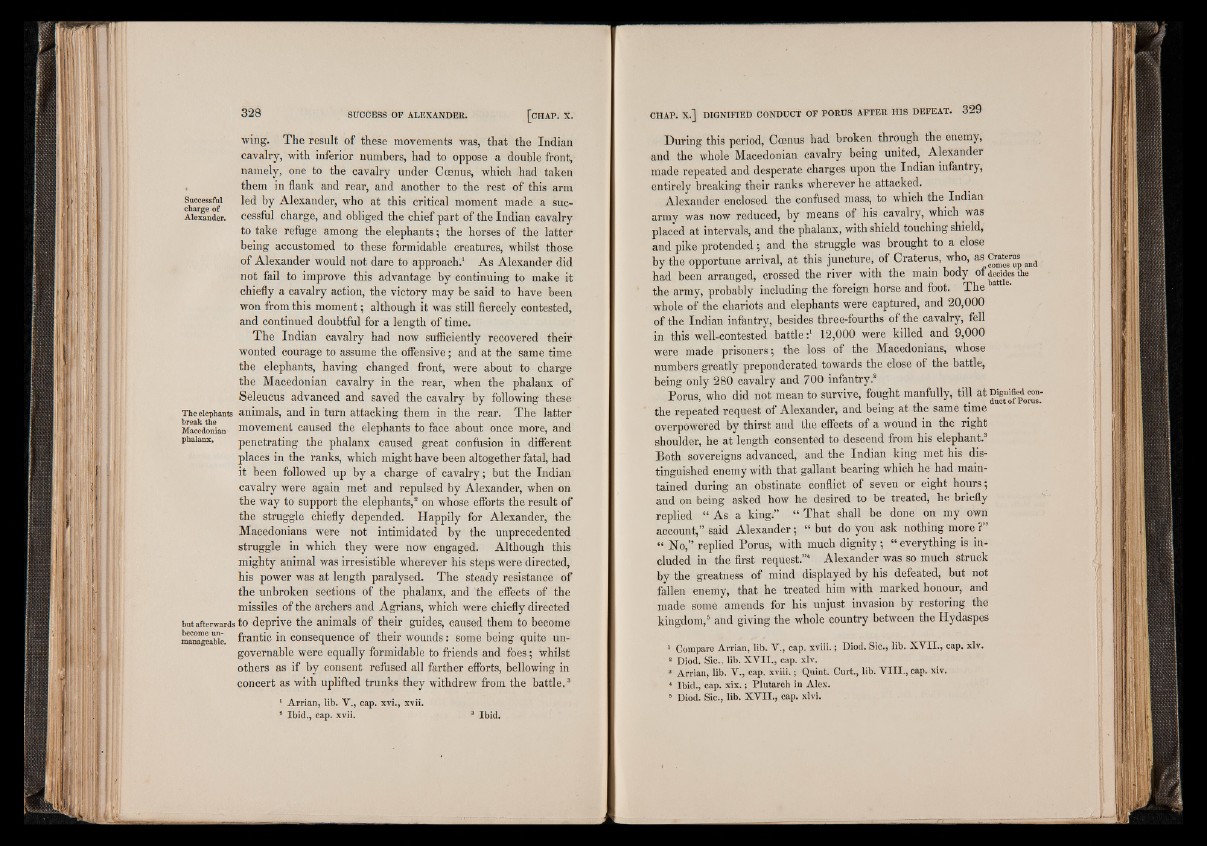
wing. The result of these movements was, that the Indian
cavalry, with inferior numbers, had to oppose a double front,
namely, one to the cavalry under Ccenus, which had taken
them in flank and rear, and another to the rest of this arm
Successful led by Alexander,CD3.riffi OT who at this critical moment made a sue-
Alexander, cessful charge, and obliged the chief part of the Indian cavalry
to take refuge among the elephants; the horses of the latter
being accustomed to these formidable creatures, whilst those
of Alexander would not dare to approach.1 As Alexander did
not fail to improve this advantage by continuing to make it
chiefly a cavalry action, the victory may be said to have been
won from this moment; although it was still fiercely contested,
and continued doubtful for a length of time.
The Indian cavalry had now sufficiently recovered their
wonted courage to assume the offensive; and at the same time
the elephants, having changed front, were about to charge
the Macedonian cavalry in the rear, when the phalanx of
Seleucus advanced and saved the cavalry by following these'
The elephants animals, and in turn attacking them in the rear. The latter
Macedonian movement caused the elephants to face about once more, and
phalanx, penetrating the phalanx caused great confusion in different
places in the ranks, which might have been altogether fatal, had
it been followed up by a charge of cavalry; but the Indian
cavalry were again met and repulsed by Alexander, when on
the way to support the elephants,8 on whose efforts the result of
the struggle chiefly depended. Happily for Alexander, the
Macedonians were not intimidated by the unprecedented
struggle in which they were now engaged. Although this
mighty animal was irresistible wherever his steps were directed,
his power was at length paralysed. The steady resistance of
the unbroken sections of the phalanx, and the effects of the
missiles of the archers and Agrians, which were chiefly directed
but afterwards to deprive the animals of their guides, caused them to become
manageable, frantic in consequence of their wounds: some being quite ungovernable
were equally formidable to friends and foes; whilst
others as if by consent refused all farther efforts, bellowing in
concert as with uplifted trunks they withdrew from the battle. 3
1 Arrian, lib. V., cap. xvi., xvii.
! Ibid., cap. xvii. 3 Ibid.
During this period, Ccenus had broken through the enemy,
and the whole Macedonian cavalry being united, Alexander
made repeated and desperate charges upon the Indian infantry,
entirely breaking their ranks wherever he attacked.
Alexander enclosed the confused mass, to which the Indian
army was now reduced, by means of his cavalry, which was
placed at intervals, and the phalanx, with shield touching shield,
and pike protended; and the struggle was brought to a close
by the opportune arrival, at this juncture, of Craterus, who, as Craterm ^
had been arranged, crossed the river with the main body of decides the
the army, probably including the foreign horse and foot. The
whole of the chariots and elephants were captured, and 20,000
of the Indian infantry, besides three-fourths of the cavalry, fell
in this well-contested battle :l 12,000 were killed and 9,000
were made prisoners; the loss of the Macedonians, whose
numbers greatly preponderated towards the close of the battle,
being only 280 cavalry and 700 infantry.8
Porus, who did not mean to survive, fought manfully, till at ^gniMcon-
the repeated request of Alexander, and being at the same time
overpowered by thirst and the effects of a wound in the right
shoulder, he at length consented to descend from his elephant.3
Both sovereigns advanced, and the Indian king met his distinguished
enemy with that gallant bearing which he had maintained
during an obstinate conflict of seven or eight hours;
and on being asked how he desired to be treated, he briefly
replied “ As a king.” “ That shall be done on my own
account,” said Alexander; “ but do you ask nothing more ?”
“ No,” replied Porus, with much dignity; “ everything is included
in the first request.”4 Alexander was so much struck
by the greatness of mind displayed by his defeated, but not
fallen enemy, that he treated him with marked honour, and
made some amends for his unjust invasion by restoring the
kingdom,5 and giving the whole country between the Hydaspes
1 Compare Arrian, lib. V., cap. x v iii.; Diod. Sic., lib. X V I I ., cap. xlv.
1 Diod. Sic., lib. X V I I ., cap. xlv.
3 Arrian, lib. V., cap. x v iii.; Quint. Curt., lib. V I I I ., cap. xiv.
4 Ibid., cap. x ix .; Plutarch in Alex.
5 Diod. Sic.,.lib. X V II., cap. xlvi.